مزار عرفای بغداد

Work by Yayha Zahuri following Ziyarat March 2025
THE SUFI SHRINES OF BAGHDAD
مزار عرفای بغداد

- Hazrat Ai Ibn Abi Talib(In Najaf)
۱.حضرت علی بن ابی طالب (در نجف)
2. Imam al-Husayn ibn Ali(In Karbala)
۲-امام حسین ( در کربلا)
3. Hazrat Habib ibn Muhammed al-Ajami al-Basri
۳- حضرت حبیب عجمی
4. Sheikh ʿAbd al-Qādir al-Jīlānī (born 1077/78, Nif, Persia—died 1166, Baghdad)
۴-شیخ عبدالقادر گیلانی
5. Hazrat Abu Sulaiman Dawud ibn Nusair al-Ta’i
۵-حضرت ابوسلیمان داوود طا
6. Hazrat Ma’ruf ibn Firuz al-Karkhi
۶-حضرت معروف کرخی
7. Hazrat Sari Saghti & Hazrat Abdul al Qasim Ibn Muhammed al Junayd Baghdadi
۷- حضرت جنید بغدادی و حضرت سری سقطی
8. Hazrat Abū ‘l-Muġīth al-Ḥusayn ibn Manṣūr al-Ḥallāj) or Mansour Hallaj
حضرت منصور حلاج
9. related to Hazrat Abū Ḥāmid Muḥammad ibn Muḥammad al-Tūsiyy al-Ghazali
حضرت منصور حلاج
10. Hazrat Shahab al Din Abu Hafs Umar al-Suhrwardi
۱۰- حضرت شهاب الدین ابوحفض عمر سهروردی
11. Imam Musa ibn Jafar al-Kasim and Imam Muhammed ibn Ali –al Javad
۱۱- امام موسی بن جعفر و امام جواد
12. Hazrat Nu’man ibn Thabit ibn Zuta ibn Marzuban (Imam Abu Hanifah)
۱۲-امام ابوحنیفه
13. Hazrat Abu bikr Shebli
۱۳.حضرت ابوبکر شبلی
Silsila
According to the Culture of the Sufis by Hazrat Zahural Hasan Sharib, fourteen prime Sufi Orders came into existence followed by forty more; of which one of the most famous and outstanding is the Qadiriyya Order so named after Abdul Qadir Jilani.
Qaderi Silsila:
Prophet Mohammad (saw)
Hazrat Ali
Hazrat Hasan Basri
Hazrat Habib Ajami
Hazrat Sulaiman Dawud Taei
Hazrat Maroof Karkhi
Hazrat Sari Saghti
Hazrat Junaid Baghdadi
Hazrat Abubakr Shebli
Hazrat Abdul Aziz Tamini
Hazrat Abolfarah Yusuf Tartusi
Hazrat Abilhasan Hankari
Hazrat Abi Saeed Mubarak Makhroomi
Hazrat Abdolghadir Gilani
Qadri Silsila buried in Baghdad
Hazrat Habib Ajami
Hazrat Sulaiman Dawud Taei Hazrat Maroof Karkhi
Hazrat Sari Saghti
Hazrat Junaid Baghdadi Hazrat Abubakr Shebli Hazrat Abdolghadir Gilani
حضرت ابوبکر شبلی
سلسله قادریه : حضرت محمد(ص) حضرت علی حضرت حسن بصری حضرت سلیمان داوود طائی حضرت معروف کرخی حضرت سری سقطی حضرت جنید بغدادی حضرت ابوبکر شبلی حضرت عبدالقادر گیلانی عرفایی از سلسله قادریه که دربغداد دفن شدند: حضرت حبیب عجمی حضرت سلیمان داوود طائی حضرت معروف کرخی حضرت سری سقطی حضرت جنید بغدادی
Hazrat Ali ibn Abi Taleb born 600 CE died 661 CE in Kufa Iraq
حضرت علی بن ابی طالب (ع)
Is a central and deeply revered Saint in Islamic history, known for his immense spiritual, intellectual and political legacy. In the Sufi tradition he holds a particularly special place as the gateway of divine knowledge. Many Sufi orders trace their spiritual lineage (silsila) back to him, considering him the origin of mystical knowledge received from the Prophet Muhammed. Source AI CHAT GPT.

Quotes from ‘The Reflections of the Mystics’. Dr Zahural Hasan Sharib.
Knowledge is life
Greed Spoils justice
When a persons’ wisdom increase his words decrease Be silent and be safe
Patience is the fruit of faith
The love of the world is the root of all troubles
Be generous but not extravagant. Be thrifty but miserly
The best of riches is the abandonment of desires. The richest of the richest is intelligence, the worst destitution is foolishness, the wilderness is vanity and the best achievement is goodness of moral character
Faith stands on four supports – endurance, conviction, justice and holy war.
The Great Mosque of Kufa (also known as Masjid al-Kufa) was a significant location for Hazrat Ali ibn Abi Talib. It was not only a place of worship but also a place where he lived and ruled for a period as caliph. It is also believed to be the place where Hazrat Ali was assassinated.
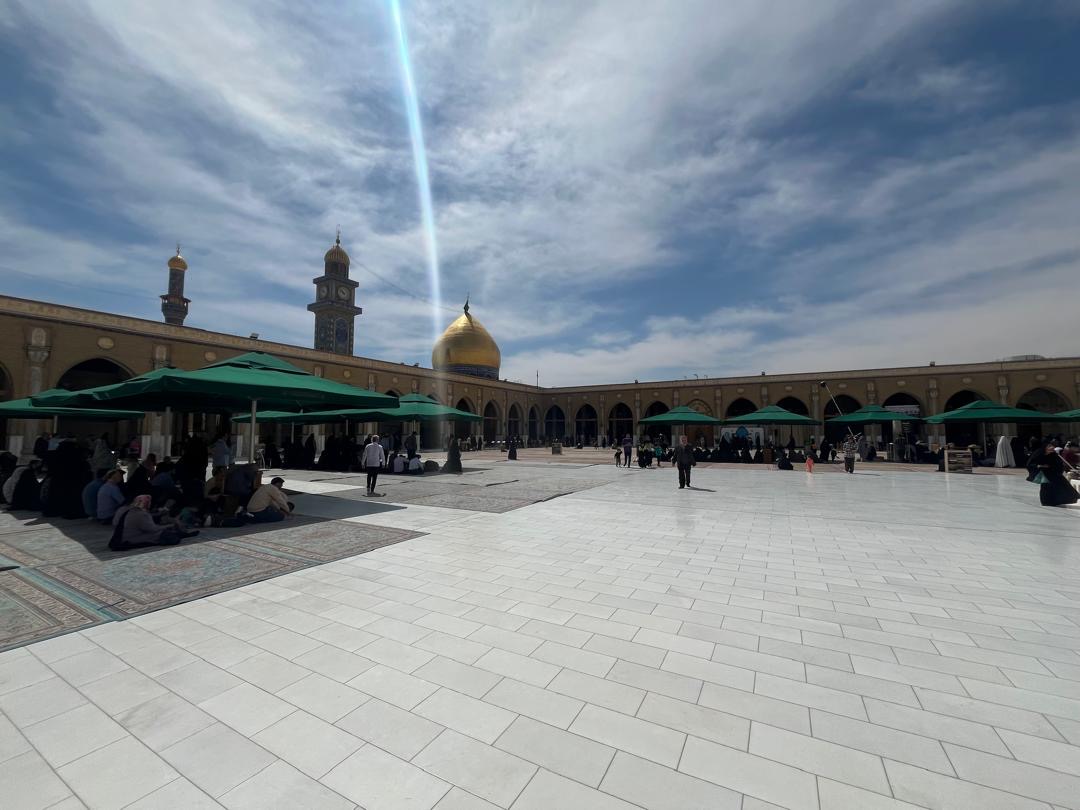
Imam al-Husayn ibn Ali died 10th Muharram 61HA
امام حسین بن علی (ع)
In the sufi tradition Imam Husayn is often seen as the ultimate lover of God who sacrificed everything for the divine truth and justice. His stand at Karbala is interpreted as the epitome of ish-e-haqiqiq (true divine love) a theme central to Sufi thought. His death is not mourned as a tragedy alone but celebrated as a spiritual victory over the lower self and worldliness. Many Sufi poets and mystics invoke Husayn as a model of the insan al-kamil (perfect human being) someone who embodies total submission to Gods will.
Click hear to read a Speech by Imam Yahya given during Muharram
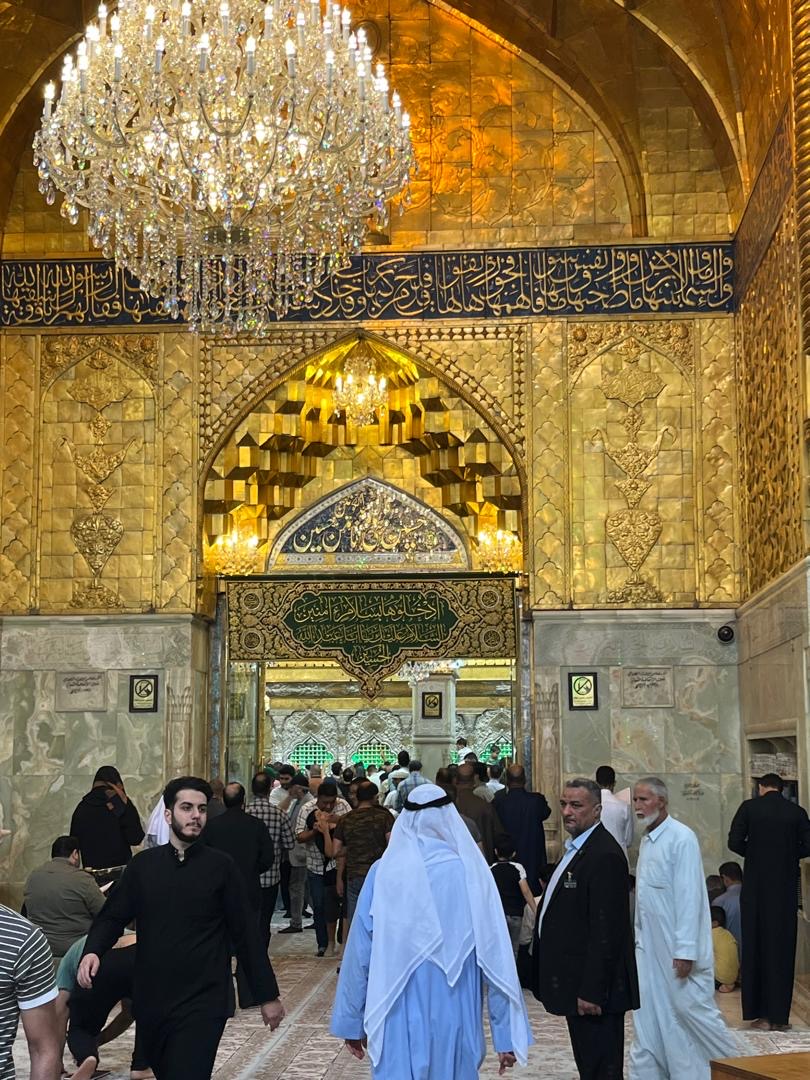

Quote from ‘Culture of the Sufis’. Dr Zahural Hasan Sharib
Adoption of the middle course is best
Hazrat Habib ibn Muhammed al-Ajami al-Basri
حضرت حبیب عجمی
Hazrat Habib Al-Ajami was a renound Sufi Saint of the 8th century. He was a disciple of Hazrat Hasan-al-Basri. Hazrat Habib Al-Ajami was known for his deep sincerity in worship, humilty and constant remembrance of God (dhikr). He is respected among the early Saints of Islam and has a revered place in Sufi literature such as Tadhkirat al-Awliya by Hazrat Farududdin Attar.
• نقل است که نماز شامی حسن بصری به صومعه حبیب رسید و حبیب نماز در پیوسته بود و الحمد را الهمد میخوامد. حسن گفت: نماز از پیاو درست نباشد.تنها نماز کرد. آن شب خدای را جل جلاله به خواب دید. گفت:«الهی رضای تو در چیست؟» گفت:« ای حسن رضای ما یافته بودی. قدرش ندانستی».ًگفت:«بار خدایا!
آن چه بود؟» گفت:« نماز از پی حبیب گزاردن. که آن نماز مهر نمازهای عمر تو خواست بود. اما تو را
راستی عبارت از صحت نیت بازداشت». بسی تفاوت است از زبان راست کردن تا دلراست کردن. • نقل است که درگوشه یی نشسته بود. میگفت:«هر که را با تو خوشنیست، هرگزش خوش مباد. هر که را چشم
به تو روشن نیست، چشمشروشن مباد. و هر که را با تو انس نیست با هیچ کسش انس مباد».
• درویش گفت: حبیب را دیدم درمرتبه یی عظیم. گفتم : آخر او عجمی است. این مرتبه از کجا یافت؟ آواز آمد که :«آری عجمی است اما حبیب است.»
Quotes from Muslim Saints and Mystics – Episodes from Tadhkirat al Auliya Farid Ul-Din-Attar.
It is said that Hasan al Basri went to Habib al-Ajami at the time of evening prayers. Hasan heard Habib al-Ajami mispronounce a word during prayer. He considered it improper to then say his prayers with him and said them separately. During the night he dreamed the Lord spoke to him ‘ Hasan if you had stood behind al-Ajami and said your prayers you would have earned our pleasure, and that single prayer of yours would have borne thee greater benefit that all prayers taken together that you have offered in your lifetime. You found fault with his pronunciation but ignored the purity and excellence of his heart. Know it that we cherish a contrite heart much more than the correct pronunciation of words’.
It is said that he was sitting in a corner muttering, “Anyone not content with you shall never be content. If someone’s eyes do not perceive Your light, let their eyes remain blind. And whoever does not share a connection with You shall have no closeness with anyone else.”
The dervish said, “I saw Habib in a magnificent state. I thought to myself, ‘He must be a foreigner. From where did he attain this rank?’ A voice was heard…” Yes he is a foreigner (Ajami) but he is dear (Habib).
Whoever wants anything from Habib, come and take it
Expel from your heart all envy of men. Close your heart against worldly things. Know that suffering is a previous prize and see that all affairs are of God, Then set foot on the water and walk.
Address :
https://maps.app.goo.gl/qfCa96XaKLdXBrct6?g_st=com.google.maps.preview. copy
Baghdad Governorate, Iraq ،،89، الشواكةQM+JC2
Hazrat Abu Sulaiman Dawud ibn Nusair al-Ta’i
حضرت سلیمان داوود طائی
Hazrat Abu Sulaiman Dawud ibn Nusair al-Ta’i was a man of notable erudition, a pupil of Abu Hanifa, he was converted to the ascetic life by Habib al Ajami He died between 777 and (782) AD
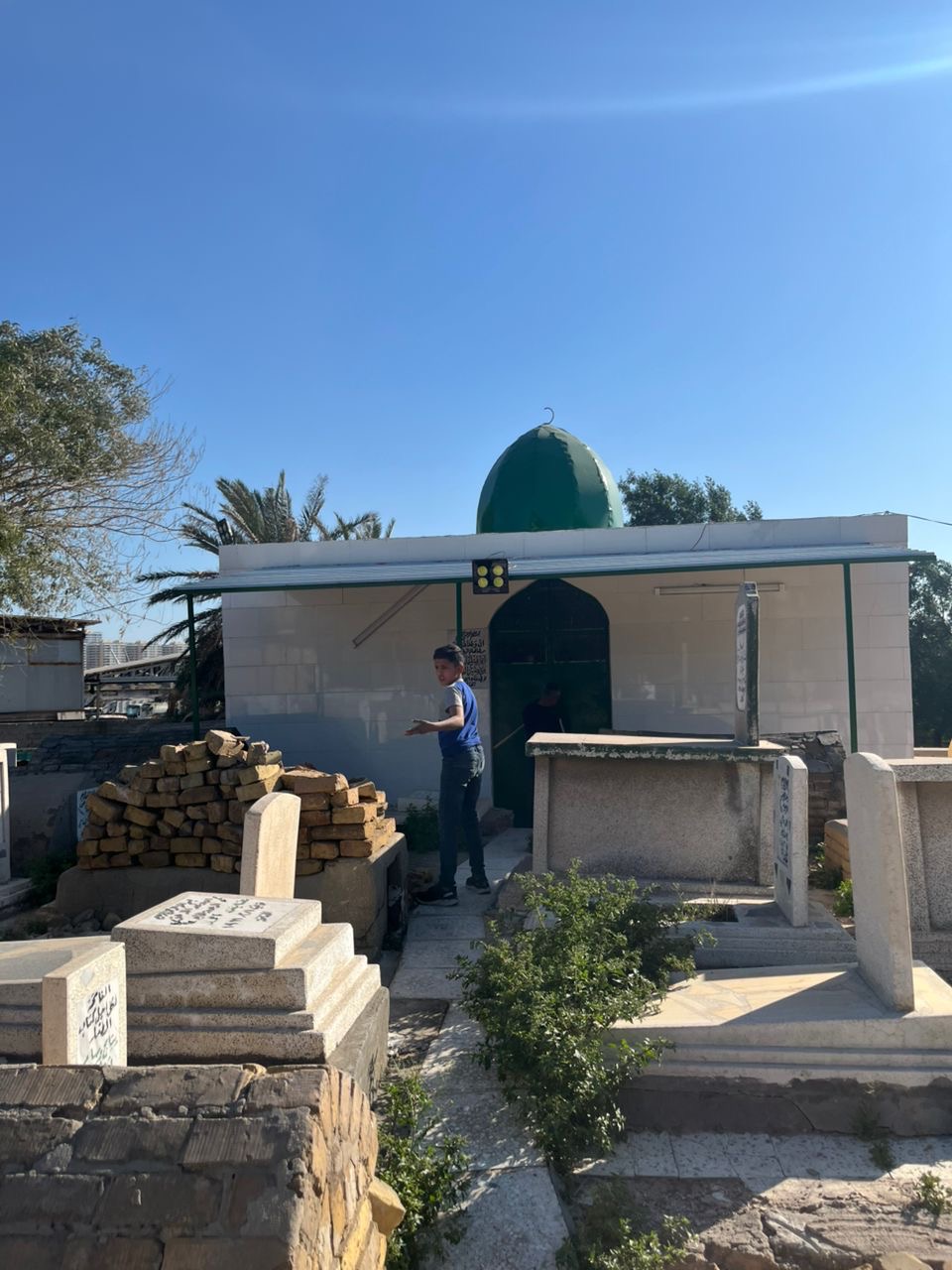

Quotes from Muslim Saints and Mystics – ‘Episodes from Tadhkirat al Auliya Farid Ul-Din-Attar.
‘What has transpired with you?’ Abu Hanifa asked. Dawud related to him the foregoing incident. ‘The world has lost its attractions for me. Something has happened inside of me which I cannot understand nor can I discover the explanation of it in any book or legal pronouncement.’
‘Turn away from other men’ Abu Hanifa prescribed. So Dawud turned his face from other men and shut himself up in the house. After a long interval, Abu Hanifa went to see him. ‘This is not the solution, for you to hide in your house and not utter a word. The proper course is for you to sit at the feet of the imams and listen to them propounding novel ideas. You should attend to what they have to say patiently, uttering not a word. Then you will know those problems better than they. Recognising the good sense of what Abu Hanifa said, Dawud resumed his studies. For a year he sat at the feet of the imam, never opening his mouth and accepting their pronouncements with patience, being content to simply listen and not to reply.
This one years patience, he remarked at the end of that time is equivalent to thirty years strenuous work’
• از اول کار در اندرون او حزنی غالب بود و پیوسته از خلق رمیده بود. • نقل است که سرایی بزرگ داشت و در آنجا خانه بسیار بود. یک خانه خراب می شد و با خانه دیگر می نشست.
گفتند:«چرا عمارت خانه نکنی؟» گفت:«با خدای عز وجل عهدی است که دنیا را عمارت نکنم.» همه سرای او فرو افتاد،جز دهلیز. آن شب که او را وفات رسید دهلیز نیز فرو افتاد»
• مریدی را گفت :«اگر سلامت خواهی، سلامی کن بر دنیا به وداع و اگر کرامت خواهی، تکبیری بر آخرت گوی به ترک». یعنی از هر دو بگذر تا به حق توانی رسید .
Translation: It is said that he had a grand mansion with numerous rooms. One room was being demolished, and he went to other room. They said, “Why don’t you fix the house?” He replied, “With Almighty God, I have made a covenant not to fix the world.” All of his rooms toppled, except for the corridor. The night he passed away, the corridor also collapsed
To His disciple said, “If you seek salvation, bid farewell to the world with peace, and if you seek nobility, proclaim a Takbir of renunciation to the hereafter.”
Address :https://maps.app.goo.gl/gYnTo5XrpmcRVe9r6?g_st=com.google. maps.preview.copy
89MC+WMP, Baghdad, Baghdad Governorate, Iraq (Hazrat Daud taii)
Hazrat Ma’ruf ibn Firuz al-Karkhi
650 (132AH) and 815CE (200AH
حضرت معروف کرخی
He was born in Karkh , a district of Baghdad to a Christian family and is said to have converted to Isam at a young age. He was a disciple of Dawud al-Tai who was a disciple of Abu Hanifa and Hazrat Habib Ajami, known for his immense humility, love for Allah and generosity, Hazrat Ma’ruf Firuz a—Karkhi advocated tawakkul (trust in God) and Sabr (patience). He played a pivotal role in influencing late Sufi thought, particularly Saints like Sari al Saqati who was the teacher of Hazrat Junayd al-Baghdadi.
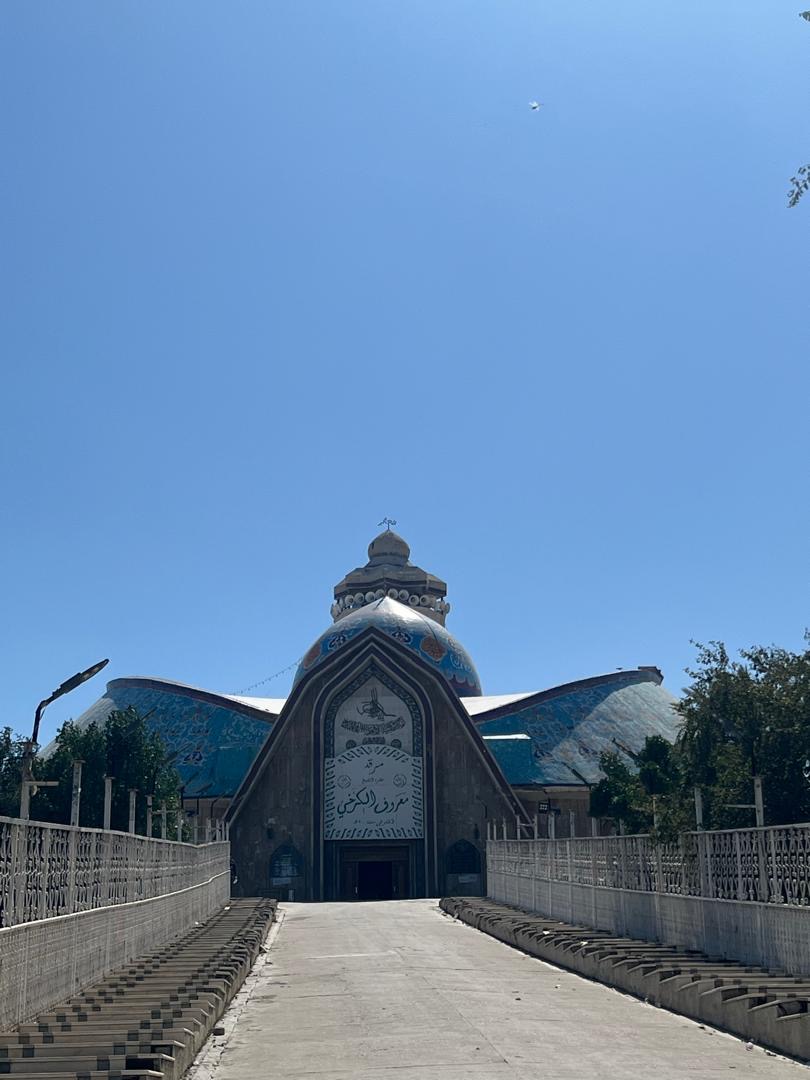

گفتند تصوف چیست؟ گفت: گرفتن حقایق و گفتن بدقایق و نومید شدن از آنچه هست در دست خلایق.
Quotes from ‘The Reflections of the Mystics’. Dr Zahural Hasan Sharib.
The marks of the Saints of God are those that their thought is of God Their dwelling is with God
And their business is in God
علامت اولیای خدای سه چیزاست ؛ اندیشه ایشان از خدای بود و قرار ایشان با خدای بود و شغل ایشان در خدای بود.
Sufism is to be indifferent to that thing which is in the hands of people
گفتند تصوف چیست؟ گفت: گرفتن حقایق و گفتن بدقایق و نومید شدن از آنچه هست در دست خلایق.
• نقل است که روزی معروف را مسافری رسید و در خانگاه قبله نمیدانست. روی به طرفی دیگر کرد و نماز گزارد. بعد از آن چون او را معلوم گشت، از آن خجل شد. گفت:«آخر چرا مرا خبر نکردی؟» شیخ گفت:«ما درویشیم و درویش را با تصرف چه کار؟» و آن مسافر را مراعات بی حد کرد.
• وگفت چون خدای تعالی به کسی خیری خواهد، بر او بگشاید در عمل و بربندد بر ویدر کسل. • وگفت:«منراهیمیدانمبهخدایعزوجل–آنکهازکسیچیزینخواهیوهیچتنبودکهکسیازتو
خواهد.»
• سری گفت: معروف مرا گفت:« چون تو را به خدای عز و جل حاجتی بود، سوگندش ده، بگو: یا رب ! به
حق معروف کرخی که حاجت من روا کنی. که حالی اجابت افتد.»
Translation: It is said that some day a guest came to him and did not know the direction of Qibla and prayed in a wrong direction. He frowned when he became aware of it and felt embarrassed. He said, “Why didn’t you inform me earlier?” The elder replied, “We are dervishes and what shall a dervish do with interference ?” He showed limitless hospitality to the traveller.
He said, “When God Almighty intends good for someone, He will facilitate actions for them and will remove laziness from their path.”
Hazrat Sari said than Maroof told me, “When you are in need of something from God Almighty, swear by Him and say: ‘O Lord! By the honour of Ma’roof Karakhi, fulfill my need. So that your request shall be granted.”
Address : https://maps.app.goo.gl/1uML2jKm41dmrTq86?g_st=com.google.maps.p review.copy
89MF+FP2, Baghdad, Baghdad Governorate, Iraq
Sheikh ʿAbd al–Qādir ibn Abi Salihal-Jīlānī al Hasani wa’l Husayni (born 1077/78, Nif, Persia—died 1166, Baghdad)
شیخ عبدالقادر گیلانی
Hazrat Adbul Qadir al Jilani is a prominent Sufi Saint, scholar and the founder of the Qadiriyya Sufi Order. He emphasised inner purification, submission to God, service to humanity and love for the Prophet Muhammed. He became known as Ghous al Azam (the supreme helper).
Link to a video of Sheikh ʿAbd al-Qādir al-Jīlānī
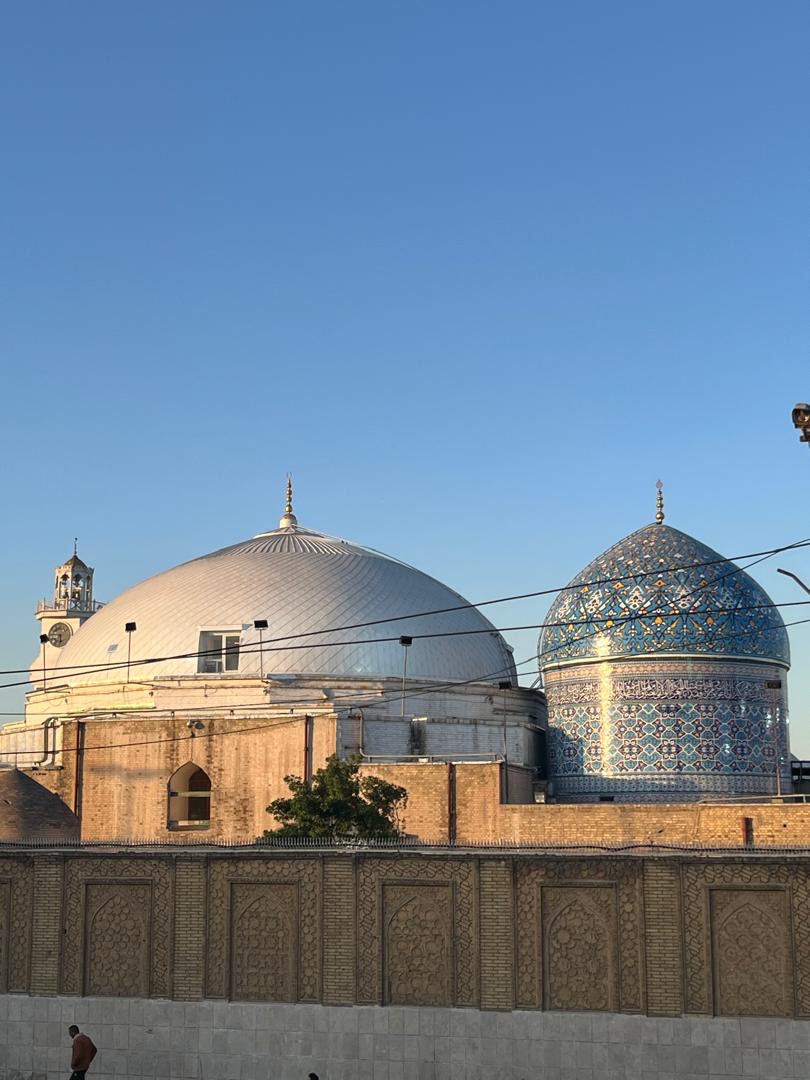
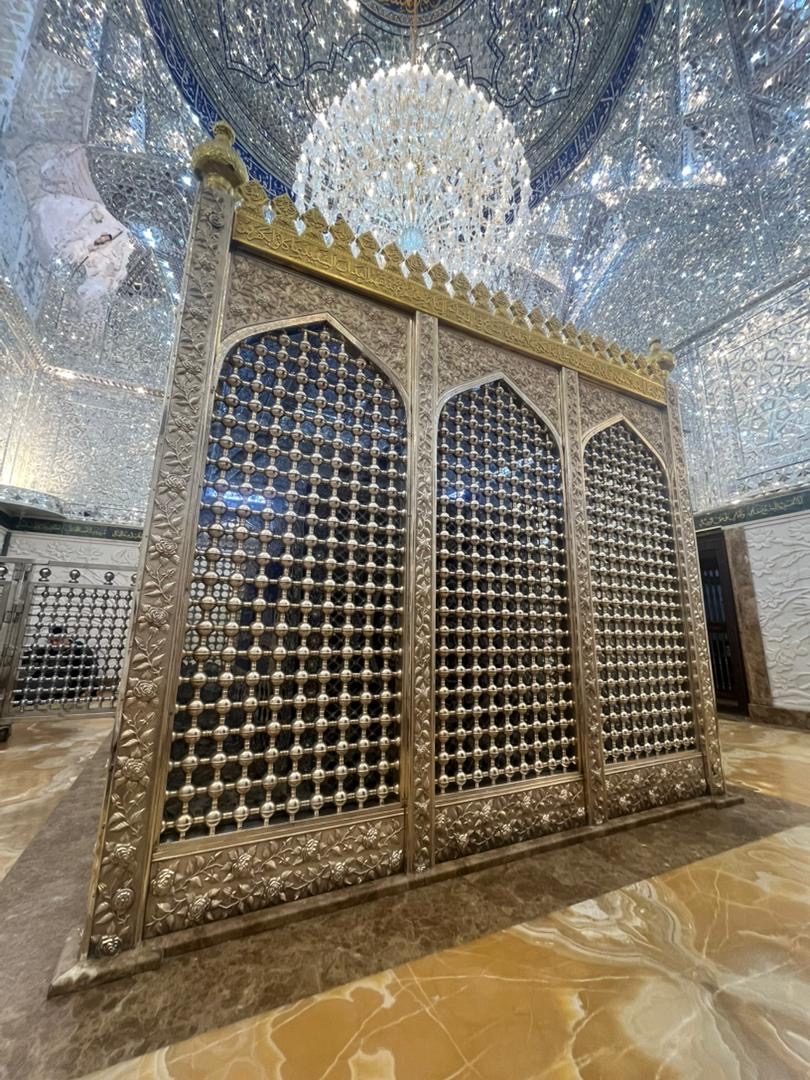
Quotes from ‘The Reflections of the Mystics’. Dr Zahural Hasan Sharib.
Mohabbat is veil between the lover and the Beloved.
When the lover is lost to love He attains Union with the Beloved.
• مگذار خصومت،بدخواهی و دشمنی نسبت به کسی یک شب در دلت بماند و دعا کن برای هر آن که بر تو ستم کرده است .
• از احدی نترس و از کسی انتظاری نداشته باش. تمامی أمور خود را به الله بسپار و تنها از او بخواه و به کسی جز الله تکیه و اعتماد مکن.
• طواف کعبه کن حاجی مرا بگزار در کویش که حج اکبر عاشق طواف کوی دلداراست
• خشیة الله دقیقا همان علم است. زیرا «انما یخشی الله من عباده العلما » منظور از علما در ای آیه کسانی هستند که به علمشان عامل اند ، در برایر آنچه میکنند انتظاری از خداوند ندارند و وجه الله و محبت الله را به عنوان تنها هدف برگزیده اند.( از کتاب عبدالقادر گیلانی نوشته داود وفایی ص۲۱۶)
• تصوف بر ۸پایه استوار است ، سخای ابراهیم (ع) ، رضای إسحاق(ع) ، صبر ایوب (ع) ، اشارت زکریا(ع) ، غربت یحیی (ع) ، صوفپوشی موسی (ع) ، سیاحت عیسی (ع) و فقر محمد (ص) (همان کتاب ص ۱۶۴)
• در روز قیامت اگر برای محب راهی برای نرفتن به بهشت و ماندن مزد محبوب باشد قطعا همان را انتخاب خواهد کرد. زیرا کارهایی که محب میکند برای حق است نه بهشت. (همان ص ۲۸۶)
• از بلا نگریز . بلایی که در برابرش صبر کنی راس همه أمور خیر است. أساس و بنای رسالت ، نبوت، ولایت، معرفت و محبت بر بلا استوار است.(همان ص ۱۹۳)
Translation: Do not fear anyone and expect nothing from anyone. Entrust all your affairs to God alone, and only ask from Him, and do not rely on anyone but God.
Perform the Tawaf around the Kaaba, Hajji, and let me roam in its alley, for the greater Hajj is the lover of circling the alley of the Beloved’s heart.”
Address:
https://maps.app.goo.gl/WyYvUPFicquU3Rme7?g_st=com.google.maps.previe w.copy
8CP5+P83, Baghdad, Baghdad Governorate, Iraq
Hazrat Abū ‘l–Muġīth al–Ḥusayn ibn Manṣūr al–Ḥallāj) or Mansour Hallaj
حضرت منصور حلاج
According to Episodes from Tadhkirat al Auliya Farid Al Attar, Hazrat Hallaj was the most controversial figure in the history of Islamic mysticism. Born in in 858 AD near al-Baiza in the province of Fars. His bold preaching of the union with God caused him to be arrested on charge of incarnationism. He was condemned to death and executed on 29 Dhu ‘lQada 309 AD.
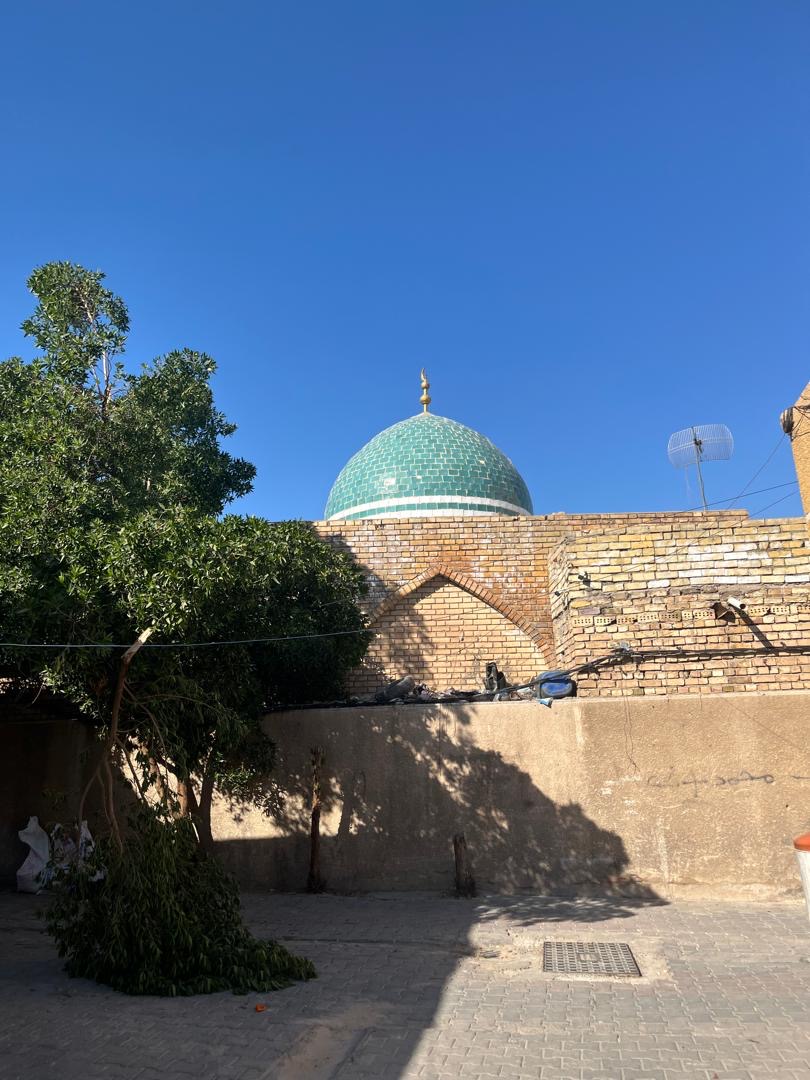
Quote from ‘The Reflections of the Mystics’. Dr Zahural Hasan Sharib.
The essence of mohabbat is that thou shouldst shake of thy qualities and subsist in the beloved
Quotes from Muslim Saints and Mystics – ‘Episodes from Tadhkirat al Auliya Farid Ul-Din-Attar.
I am the truth
I am Gods captive, I am the sentinel of salvation. If i so wish, with one signal I can lose all bonds.
My boon companions not to be accused of mean inequity
He made me drink like him the dregs
as does the generous host his guest And when the round was quite complete He called for sword and winding sheet Such is his fate, who drinks past reasons With Draco in the summer season
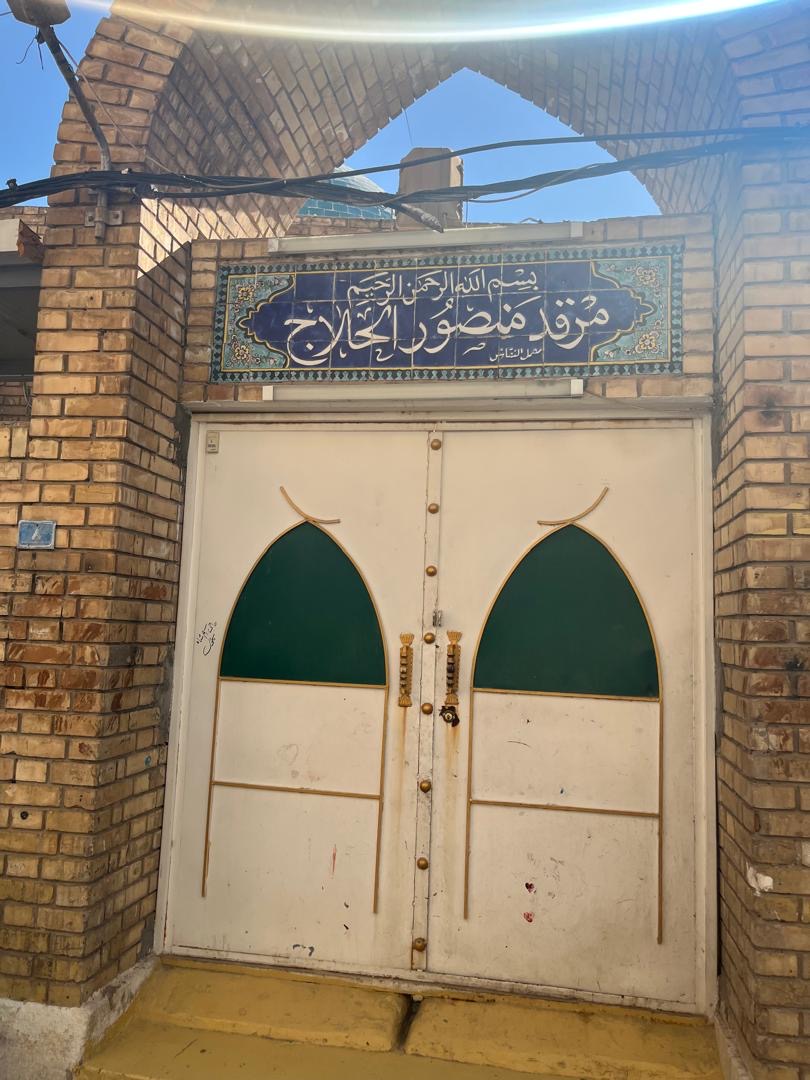

“Al Qushayri says this about him; “If one is acceptable, he will not be rejected by people and if one is rejected, he will not be accepted by people.”
Oh God! You know that I am incapable of gratitude. Instead of me, express gratitude for yourself, for that is gratitude enough.
And he said: The great individual is one in whom the mistreatment of people does not leave a mark on him ; thus, he has truly known God Almighty.
And he said: “Let us all, year after year, be in search of his calamity like a king who is always in search of sovereignty.”
استاد ابوالقاسم قشیری در حق او گفت که:« اگر مقبول بود به رد خلق مردود نگردد و اگر مردود بود به قبول خلق مقبولنگردد.»
الهی! تو می دانی که عاجزم از شکر، تو به جای من شکر کن خود را، که شکر آن است و بس. و گفت: خلق عظیم آن بوذ که جفای خلق در او اثر نکند ، پس آنگاه خدای-تعالی- را شناخته باشد. و گفت:«ما همه سال در طلب بلای او باشیم چون سلطانی که دایم در طلب ولایت باشد. و گفت مرید آن است که سبقت دارد اجتهاد او بر مکشوفات او و مراد آن است که مکشوفات او بر اجتهاد سابق است. و پرسیدند از صبر گفت آن است که دست و پای او ببرند و از دار درآویزند. و عجب آن که این همه با او کردند جمله بر قتل او اتفاق کردند از آنکه میگفت :«انا الحق» گفتند بگو :«هو الحق». گفت :« بلی همه اوست . شما
میگویید که : گم شده است؟ بلی که حسین گم شده است.
پس در بار ببردند تا بکشند. صدهزاز آدمی گرد آمدند و او چشم گرد همه بر میگردانید و میگفت : حق ، حق ، أنا الحق.
نقل است که درویشی در آن میان از پرسید که عشق چیست؟ گفت:«امروز بینی و فردا و پسفردا.» آن روزش بکشتند و دیگر روز بسوختند و سیوم روز بر بادش دادند.
بزرگی به خوابش دید ایستاده جامی در دست و سر برتن نه ، گفت ؛«او جام به دست سر بریدگان میدهد.»
Translation: They asked him about patience, he said it is when they chop off his arms and legs and hang him from the gallows, it is indeed strange that they did all this to him.
The sentence for his murder occurred because he said: “I am the truth”, they said say: “He is the truth”. He said: “Yes, indeed, everything is him. You say he is lost? Yes, indeed, Hussain is lost.
They agreed to kill him rather than saying, “I am the truth.” They said, “He is the truth.” He said, “Yes, indeed he is. You say he is lost? Indeed, Hussein is lost.”
So they took him away to kill him. Hundreds of people gathered, and he turned all around with tears in his eyes, saying, “Truth, truth, I am the truth.”
It is said that a dervish asked Meanwhile, “What is love?” He replied, “you will see that Today, tomorrow, and the day after.” They killed him that day, and on another day they burned him, and on the third day they scattered his ashes to the wind.
He saw greatness in his dream, standing with a cup in his hand and not having a head, saying, “He gives the cup to those who have cut off their heads.”
Address:
https://maps.app.goo.gl/XekDDbZAW3r1vMqx8?g_st=com.google.maps.previe w.copy
89JG+HP6, Baghdad, Baghdad Governorate, Iraq
Related to Hazrat Abū Ḥāmid Muḥammad ibn Muḥammad al-Tūsiyy al-Ghazali
منسوب به امام غزالی

Quotes from ‘The Reflections of the Mystics’. Dr Zahural Hasan Sharib.
The man who forsakes the world as a show of generosity or in quest of the hereafter, cannot be called a recluse. According to the Saints even to abandon the work for the hereafter is weak abstinence.
A true gnostic is he who is not attached to the hereafter in the same way as he is not attached to this world and everything save God has no value in his eyes.
و بدان که فروختن دنیا به اخرت زهدی ضعیف است نزدیک اهل معرفت؛ بلکه عارفآن است مه آخرت از پیش وی برخیزد همچنان که دنیا. بلکه از دنیا و آخرت جز حق تعالی نخواهد و جز به معرفت و مشاهدت وی قناعت نکند و هر چه جز اوست همه در چشم وی حقیر گردد.
With heartfelt certainty I came to believe that eminent Sufis alone are the veracious travellers on the path of God and their disposition manners and habits alone are superior to all others.
• بدان که صبر خاصه آدمی است ؛ که بهایم را صبر نیست که بس ناقصند و ملایکه را به صبر حاجت نیست که بس کاملند و از شهوت فارغ.
Address: https://maps.app.goo.gl/bwZHwAf2hug38Dc68?g_st=com.google.maps.previe w.copy
8CP6+G55, Baghdad, Baghdad Governorate, Iraq
Sheikh Shahab al-Din Abu Hafs Umar al-Suhrawardi
شیخ شهاب الدین عمر سهروردی
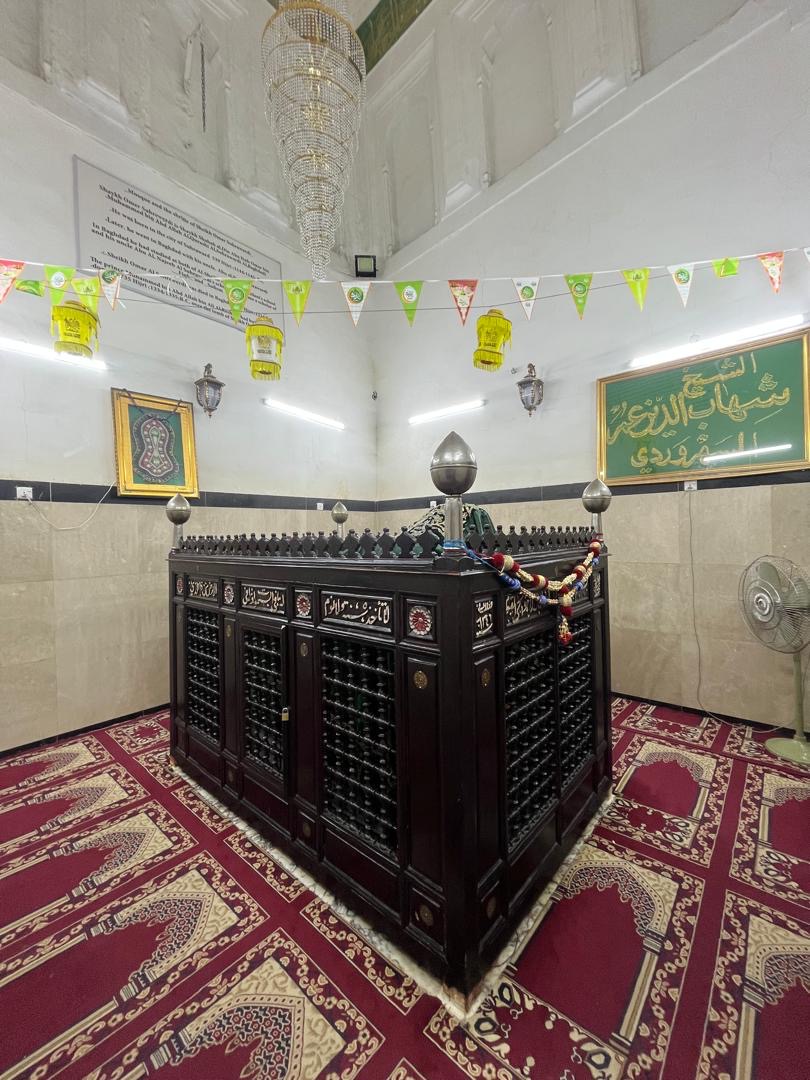
Quotes from Muslim Saints and Mystics – ‘Episodes from Tadhkirat al Auliya Farid Ul-Din-Attar.
Three kinds of people will remain deprived of the grace and mercy of God.
First come those old people who are involved in sin.
Secondly young people who due to the hope of repentance do not give up committing sin
Thirdly comes the king who speaks a lie.
سعدی درباب ویگوید : مرا شیخ دانای مرشد شهاب. دو اندرز فرمود بر روی آب یکی اینکه در نفس خودبین مباش. دگر آنکه در جمع بدبین مباش
از وصیت نامه شیخ ترجمه از محمد شیروانی
هر گاه دلتنگ شدی علتش را بازرسی کن که همانا خدای آن علت و راه برطرف کردن آن را به تو میشناساند و جایگاه انس و گشاده دلی را می نمایاند.
در امان مباش از مکر خدا ، نومید مباش از رحمت او و زندگی کن میان بیم و امید.
در دنیا چنان بزی همانند اینکه غریبی و برون شو از آن ، آنچنانکه داخل شدی در آن ، همانا که تو نمیدانی فردای قیامت نام تو چیست.
Sa’di says this about him :
My wise and knowledgeable guide is Master Shihab. He gave me two pieces of advice to reflect upon.
One is not to be self-obsessed, and the other is not to be negative in gatherings.
Translation from the will of the Sheikh by Mohammad Shirvani:
Whenever you feel homesick, investigate the reason. Surely, God knows that reason and the way to resolve it, and shows you the path to peace of mind and a tranquil heart.
Don’t be safe from fear of God, do not despair of His mercy, and live between fear and hope.
Live in this world like a stranger, detach from it. Just like you entered it, leave it, for you do not know what will be your name on the day of resurrection.
Address: https://maps.app.goo.gl/4i1GhoZsiXm7KLXY8?g_st=com.google.maps.previ ew.copy
9C22+5V8, Baghdad, Baghdad Governorate, Iraq
Shrine of Nu’man ibn Thabit ibn Zuta ibn Marzuban (Imam Abu Hanifah)
امام ابوحنیفه
Imam Abu Hanifa was a Muslim scholar, jurist, theologian, ascetic, and eponym of the Hanafi school of Sunni jurisprudence, which remains the most widely practiced to this day. His school predominates in Central and South Asia, Turkey, the Balkans, Russia, and some parts of the Arab world.

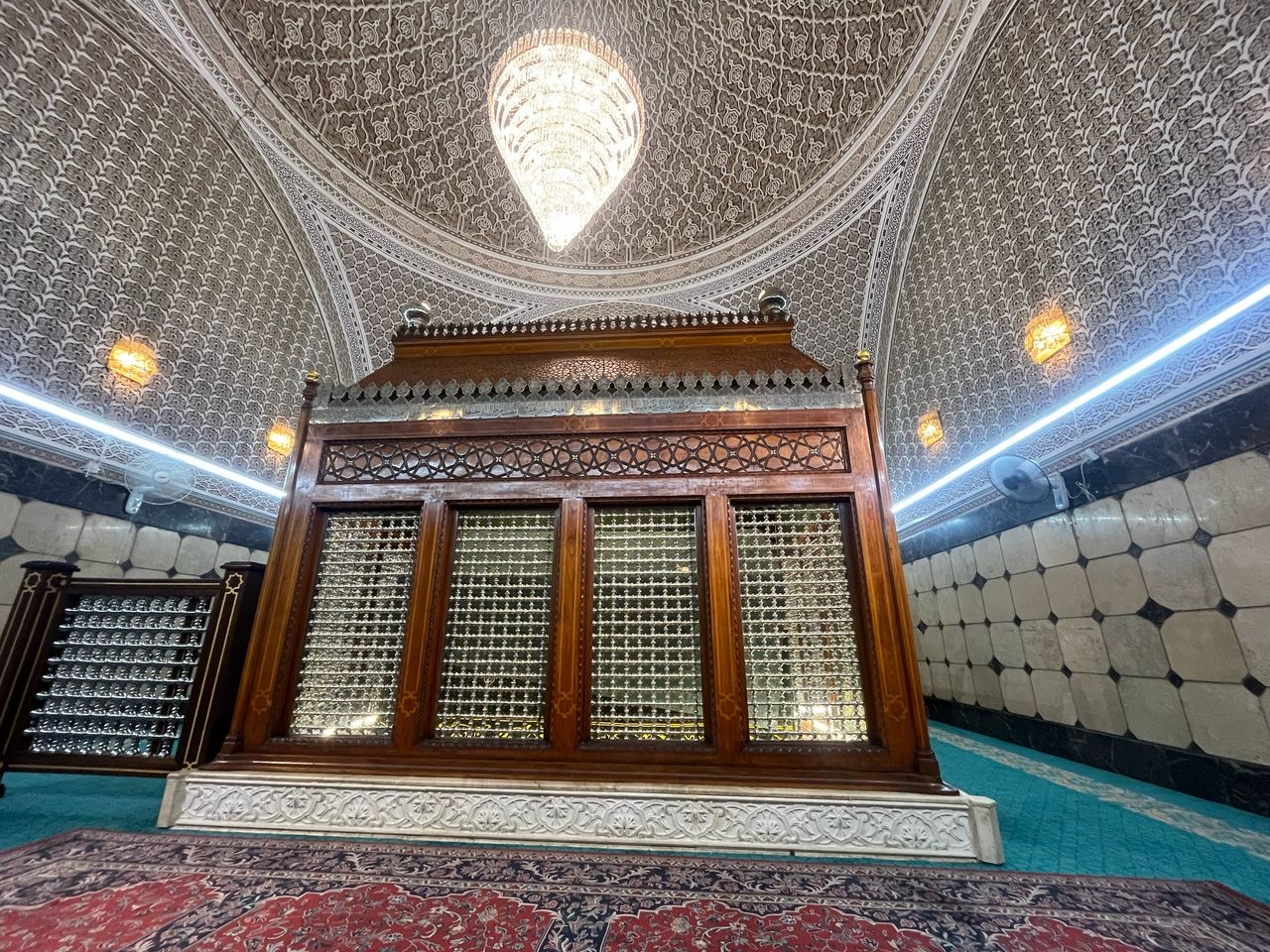

Related a narrative from the Messenger of Allah, peace and blessings be upon him and his family, about a man who will be among my followers. He will be known as Nu’man ibn Thabit and known by the title Abu Hanifah, the light of my community. The character of Abu Hanifah was in the Torah, and Abu Yusuf said: I served him for nineteen years, during which he observed morning prayers with the ablution on night prayer.
It is said that when Dawud al-Tai followed his own path,to Abu Hanifah said : “Now what should I do?”
He responded: “May it be upon you to bind yourself to knowledge, for any knowledge that you do not apply is like a lifeless body without a soul.”
وانس روایت کرد از رسول صلی الله علیه و آله و سلم که مردی باشد در امت من. یقال له نعمان بن ثابت و کنیته ابوحنیفه هو سراج امتی. صفت ابوحنیفه در تورات بود و ابویوسف گفت: نوزده سال در خدمت وی بودم، در این .نوزده سال نماز بامداد به طهارت نماز خفتن گزارد
و گویند که که چون داود طایی مقتداشد، ابوحنیفه را گفت: اکنون چه کنم؟ گفت: بر تو باد بر کار بستن علم که هر علمی که آن را کار نبندی چون جسدی بود بی روح.
Address: https://maps.app.goo.gl/UJKnbrBCp8SiZYPH9?g_st=com.google.maps.preview.c opy
Baghdad, Iraq ,،،99, جامع الإمام الأعظم، بغدادC5+P9R
Hazrat Abdul al Qasim Ibn Muhammed al Junayd Baghdadi and Hazrat Sari Saghti
حضرت سری سقطی و حضرت جنید بغدادی
Hazrat Abdul Al Junayd al Khazzaz al-Nehawandi, son of a glass merchant and nephew of Sari al Saqati close associate of al Mohasebi, was the greatet exponent of the sober school of Sufism and elaborated a theosophical doctrine which determined the whole course of orthodox mysticism in Islam.
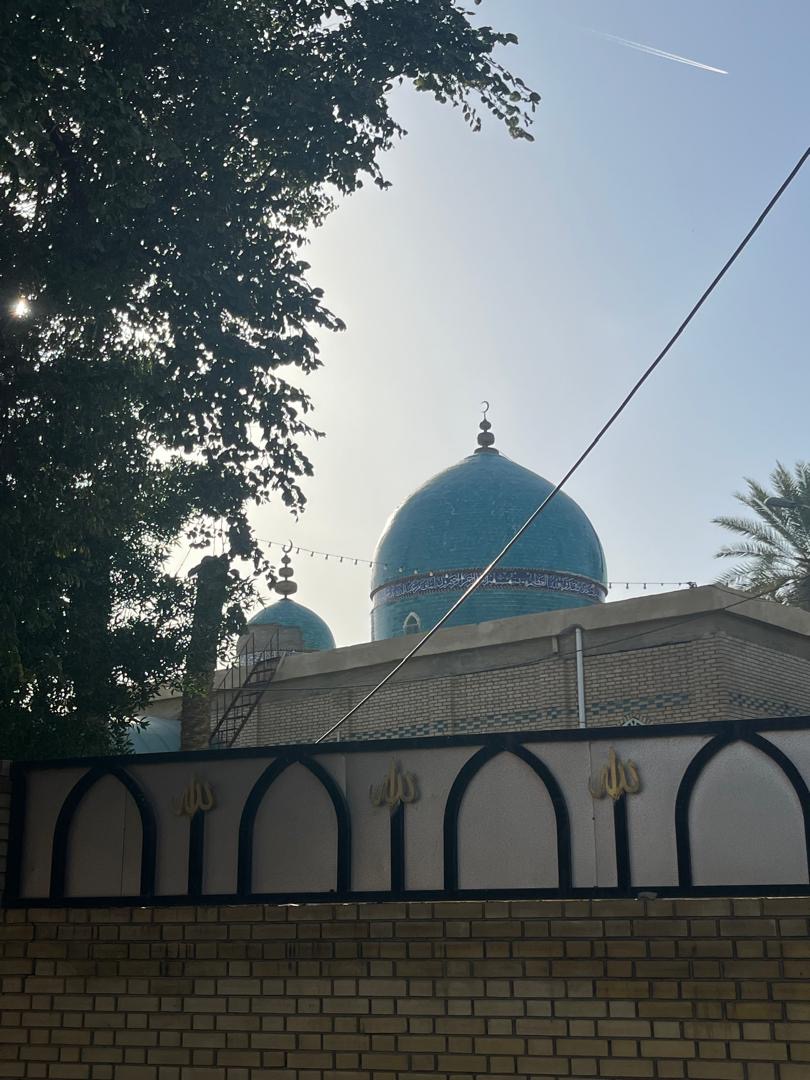
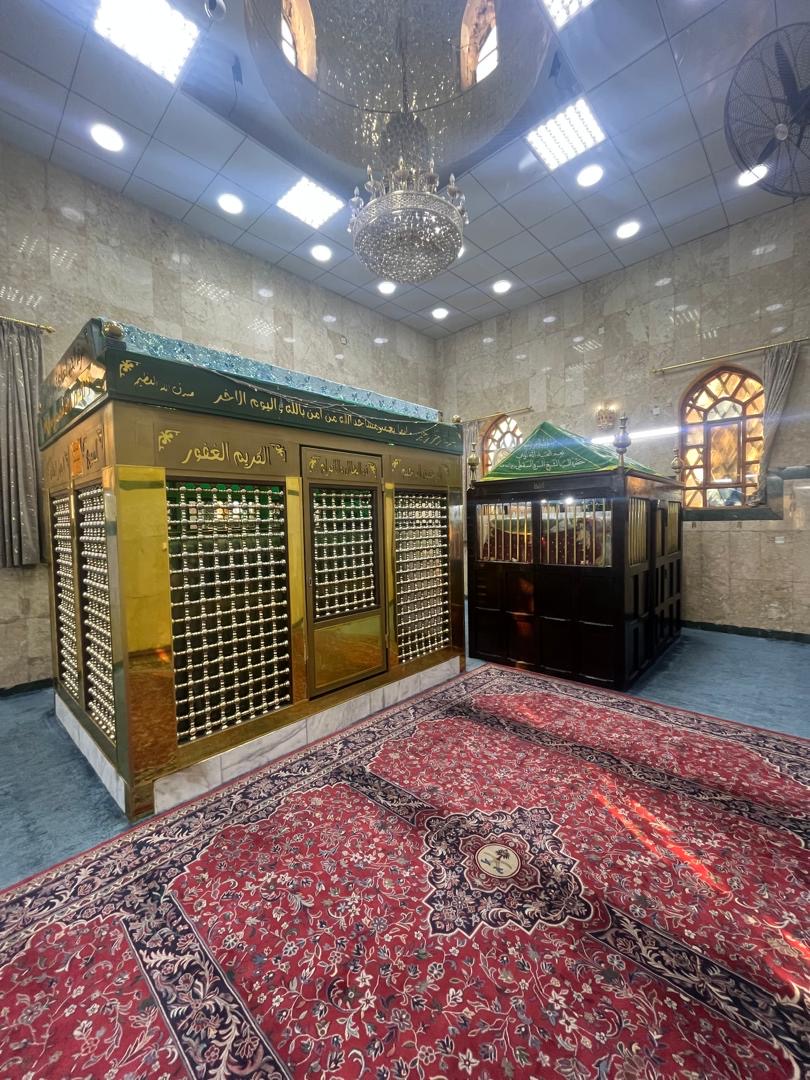
o حضرت سری سقطی چنین گوید خواهم که آنچه بر دلمردمان است بر دلمن استی از اندوه، تا ایشان فارغ بودندی از اندوه. هرگز بر دل من نگذشته است که بر هیچ آفریده مرا فضل است در کل عالم.
یکی از کوه لکام به زیارت وی آمد و پرده از آن در برداشت و سلام کرد و سری را گفت : فلان پیر از کوه لکام تو را سلام گفت. سری گفت :«وی در کوه ساکن شده است؟ بسکاری نباشد. مرد باید که در میان بازار مشغول تواند بود، چنان که یک لحظه از حق-تعالی- غایب نشود.
Translation: Hazrat Sari Saghti says thus:
I wish that whatever weighs on the hearts of people is also on my heart, so that they may be relieved of sorrow.
Never has it occurred to me that I have any superiority over any creature in the entire universe.
A man came to visit him from the mountain of Lakaam, removed the veil and greeted me, saying: “Such and such elder and Pir from the mountain of Lakaam sends you greetings.” Sari replied, “Is he settled in the mountain? It may not be appropriate. A man should be able to be engaged in the market and also he never becomes absent for a moment from the Truth.”
The saints as Junaid says has no fear because fear is the expectation of some future calamity or the eventual loss of some object of desire, whereas the saint is the son of his time. He has no future that he should fear anything, so he has no fear. He has no hope, since hope is the expectation either of gaining an object of desire or of being relieved from a misfortune and this belongs to the future. Nor does he grieve, because grief arises from the rigours of time, and how should the one feel grief who is in the radiance of satisfaction(rida) and garden of concord(muwafaqat).
حضرت جنید گوید که : مر ولی را ترس نباشد؛ از آنچه ترس از بیوسچیزی باشد که از آمدن آن بر دل کراهتی بود و یا بر تن بلایی و یا برمحبوبی میرسد که از او میفوت شود که اندر حال با وی است، و ولی مر وقت را بود ، ویرا خوف نباشد که از آن ترسد و چنان که ورا خوف نبود رجا هم نباشد؛ از آنچه رجا از امید محبوبی باشد که بدو رسد اندر ثانی حال و یا مکروهی که از وی دفع شود و اندوه نیز نباشدش؛ از آنچه اندوه از کدورت وقت بود، پس آنکه در حضیره رضا بود و روضه موافقت، اندوه وی را کجا یابد؟)کشف المحجوب هجویری)
و ( حضرت جنید) گفت رضا رفع اختیاراست.
Quotes from ‘The Reflections of the Mystics’. Dr Zahural Hasan Sharib. All from Hazrat Junaid Baghdadi
Satisfaction is the relinquishing of free will.
Sincerity is that whereby God us desired whatever the act maybe.
Gnosis is the realisation of thy ignorance when knowledge comes.
Love is the inclination of the heart.
Obedience swiftly brings glad tidings according to what God has foreordained for the obedient and similarly for with disobedience.
Address: https://maps.app.goo.gl/i9YBTZarULZvzn3u5?g_st=com.google.maps.preview.cop y
89P8+62V, Baghdad, Baghdad Governorate, Iraq
Hazrat Abubakr Al-Shibli 247 AH/861 AD, Samarra 334 AH/946 AD, Baghdad
حضرت ابوبکر شبلی
Hazrat Abu Bakr ibn Jahdar al-Shebli of Khorasan by origin but born in Baghdad of Samarra sone of a court official and himself promoted in the imperial service as a governor of Demavend was summoned to Baghdad to be invested and there experienced conversion. Joining the circle of Al Junyad he became a leading figure in the stormy history of al-Hallaj notorious for his eccentric behavior.. He died in 334 AH AD (846) at the age of 87.
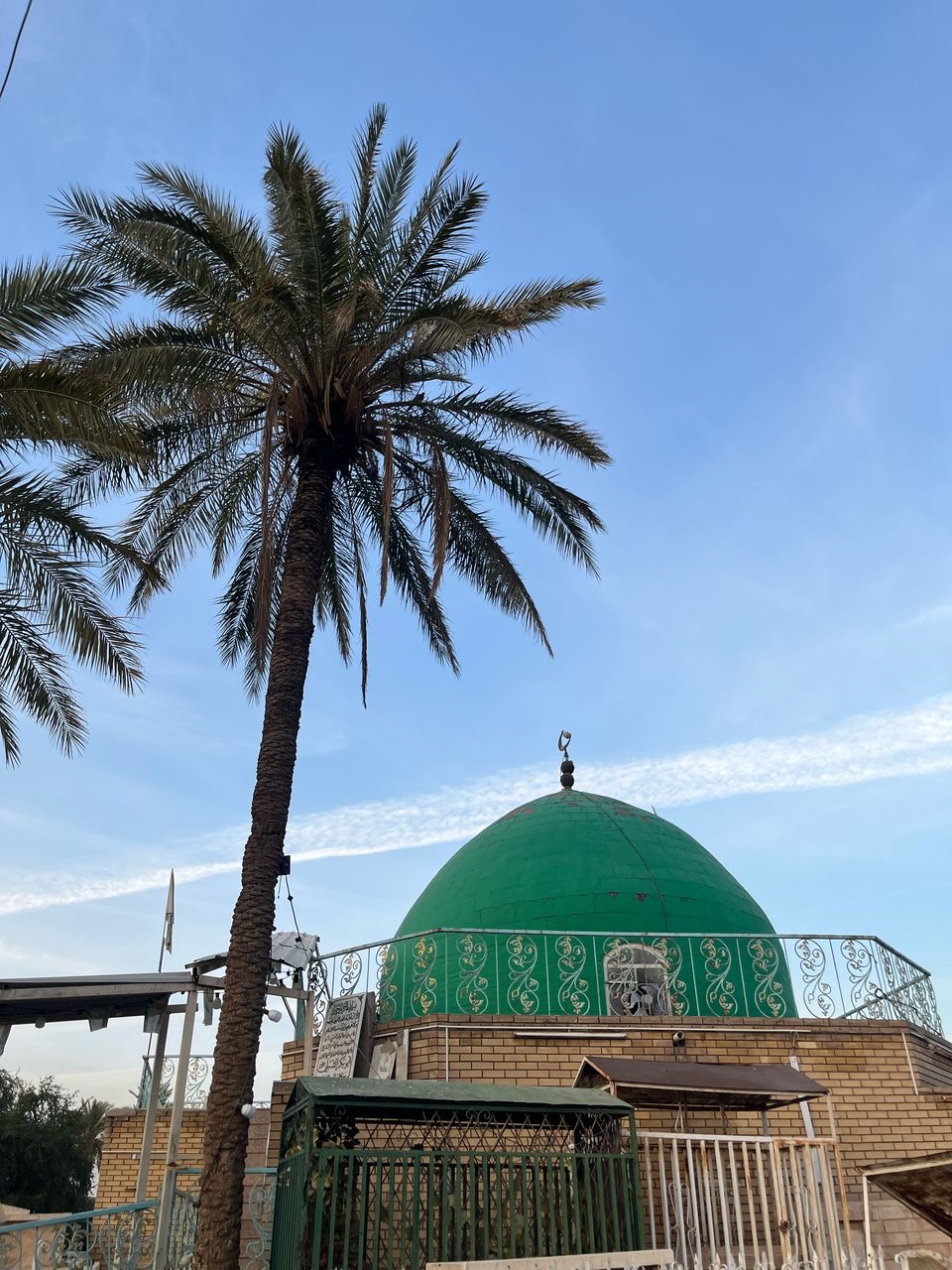
Quotes from Muslim Saints and Mystics – Episodes from Tadhkirat al Auliya Farid Ul-Din-Attar.
روزی جمعی پیش او رفتند و او در بند بود.گفت:«شما کیستید؟»گفتند؛«دوستان تو.» سنگ در ایشان انداختن گرفت. همه بگریختند. او گفت:«ای دروغ زنان! دوستان به سنگی چند از دوست خود میگریزند؟ معلوم شد که دوست خودید نه دوست من».
و گفت:«عمری است تا میخواهم که با خداوند خویش خلوتی دارم که شبلی در آن خلوت در میانه نبود». و گفت:«تکیه گاه من عجز است». و گفت:«خویشتن را چنان دانم و چنان بینم که جهودان را». و گفت:«دل من بهتر از هزار دنیا و آخرت است زیرا دنیا سرای محنت است و آخرت سرای نعمت، و دل
سرای معرفت». و گفت:«هر که در دل اندیشه دنیا و آخرت دارد حرام است او را مجلس ما».
نقل است که وقتی هیزم تر دید که آتش در زده بودند و آب از سوی دیگر وی میچکید. أصحاب را گفت:«ای مدعیان!اگر راست میگویید که در دل آتش داریم از دیده تان اشک پیدا نیست».
نقل است که یک روز یکی را دید زار میگریست.گفت:«چرا میگریی؟» گفت:«دوستی داشتم بمرد» گفت :«ای نادان چرا دوستی گیری که بمیرد؟»
Translation: One day, a group of people went to him and he was in jail. He asked, “Who are you?” They said, “Your friends.” He picked up a stone and they all ran away. He said, “Oh liars! Do friends run away from some stone? It’s clear that you are friends of yourself, not mine.”
He said, “It is a lifetime that I desire to be alone with my Lord where Shibli in that solitude doesn’t exist.”
He said, “My heart is better than a thousand worlds and the hereafter because the world is a place of hardship and the hereafter is a place of blessings, and the heart is a dwelling of Knowledge.”
He said, “Whoever has thoughts of this world and the hereafter in their heart is forbidden in our gathering.”
It is narrated that once a dry log saw a wet firewood burning on one side and water being sprinkled on the other side. He said to the people around him, “Oh claimants! If you say we have fire in our hearts, tears are not visible from your eyes.”
It is narrated that one day he saw someone crying bitterly. He asked, “Why are you crying?” The person replied, “I had a friend who died.” He said, “Oh fool, why befriend someone who will die?”
So Shibli came before Junaid. “You are recommended as an expert on pearls he said. Either give me one or sell one to me. If i sell you one, you will not have the price of it, and if i give you one, having so easily come by it you will not realise its value Junaid replied. Do like me; plunge head first into the Sea and if you wait patiently you will obtain your pearl”.
“Now what shall I do”, asked Shibli “Go and sell sulphur for a year” said Junaid. Shebli did so. When the year was up, Junaid gave him new instructions. “This work brings notoriety and commerce. Go and beg for a year, so that you be not busied with aught else’. For a whole year Shebli wandered throughout Baghdad. No one gave him anything. He returned and reported to Junaid. “Now realise your own worth, for you count for nothing in the eyes of your fellows” said Junaid. “Fasten not your heart on them, neither have any regard for them. For some days you were a chamberlain and for some you acted as a governor. Now repair to your former province and seek quittance of the inhabitant there”.
After that on every place he could find inscribed the name of God. Suddenly a voice addressed him. “How long will you go about the name? If you are truly a seeker stride forth on the quest of the Named!”
These words affected him deeply. Peace and composure altogether deserted him. So powerful was the love possessing him, so completely was he overwhelmed by mystical tumult, that he went and flung himself into the Tigris. The river surged and cast him on the bank Then he hurled himself into the fire, but the flames affected him not. He sought a place where hungry lions were gathered and cast himself before them; the lions all fled away from him. He threw himself from the summit of a mountain; the wind picked him up and deposited him on the ground. His disquiet increased a thousand fold. “Woe to him” he cried “whom neither the water, nor the fire will accept neither the wild beasts nor the mountains. He who is accepted of God came a voice, is accepted of no other”. Then they loaded him with chains and fetters and carried him to the asylum.
Address: https://maps.app.goo.gl/Wg76LNxGbSinhxNW9?g_st=com.google.maps.preview.c opy
99C4+FVF, Baghdad, Baghdad Governorate, Iraq
Imam Musa ibn Jafar al-Kasim and Imam Muhammed ibn Ali –al Javad
امام موسی بن جعفر و امام محمد بن جواد
Imam Musa ibn Jafar al-Kazim (745-799 AD) ,the 7th Imam , known for his patience and forbearance, earning him the title “al-Kazim” (the Forbearing). He was the son of the Imam Sadiq. Key aspects of his life and significance , He was known as “al-Kazim,” meaning “the Forbearing,” due to his calm and patient nature. Imam Musa al-Kazim was a highly respected scholar and known for his extensive knowledge. He was known for his generosity and kindness towards others, especially the poor and oppressed.
Muhammad al-Jawad was a descendant of the Islamic prophet Muhammad and the ninth of the Twelve imams and son of Imam Reza. He is known by the epithets al-Jawād and al-Taqī
“The best worship is sincerity,”
“A bounty that is not thanked is like a sin that is not forgiven,”
“There are three qualities which allow the servant to attain God’s grace: oft-repentance, humbleness in front of others, and abundant offering of charity”
Address:https://maps.app.goo.gl/81cqPE77Ppf4JKXy5?g_st=com.google.maps.pre view.copyBaghdad, Baghdad Governorate, Iraq